Key takeaways:
- Feedback in writing is essential for growth, transforming our perspectives and enhancing creativity.
- Constructive criticism leads to deeper exploration of themes and richer emotional resonance in poetry.
- Engaging with feedback fosters community, vulnerability, and inclusivity in the creative process.
- Receiving diverse feedback helps identify blind spots and refine our voices as writers.
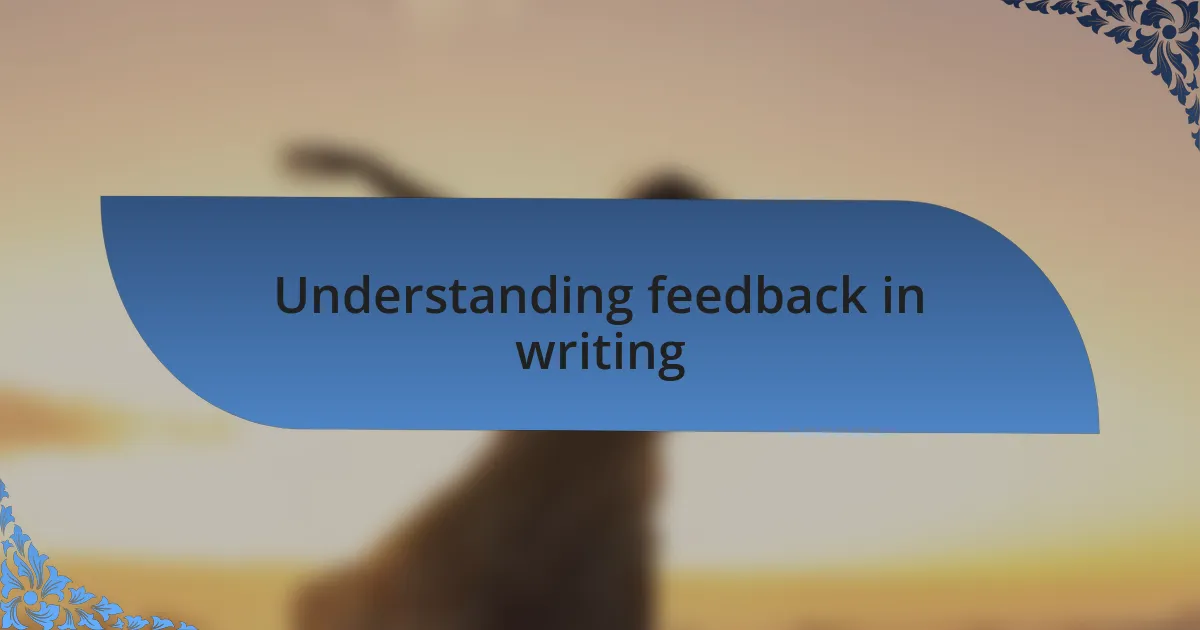
Understanding feedback in writing
Feedback in writing serves as a mirror, reflecting our strengths and weaknesses in ways that we might overlook. I vividly remember receiving a harsh critique on a poem I thought was my best work. Initially, it stung, but as I processed the comments, I realized they unveiled layers of meaning I had not fully explored. Have you ever had a moment where feedback opened your eyes to a new perspective?
Understanding feedback isn’t just about accepting praise or criticism; it’s about enhancing our craft. I once shared a piece with a writing group, and their insights helped me see how my choice of imagery could either elevate or detract from the poem’s emotional impact. Reflecting on their perspectives transformed my writing process, making me more attuned to the emotional journeys I wanted to convey.
In my experience, feedback is most valuable when approached with curiosity rather than defensiveness. Instead of dismissing opposing viewpoints, I’ve learned to ask questions and delve deeper into the reasoning behind them. This dialogue not only enriches my understanding but also strengthens my voice as a poet. What if we viewed every piece of feedback as an invitation to grow?
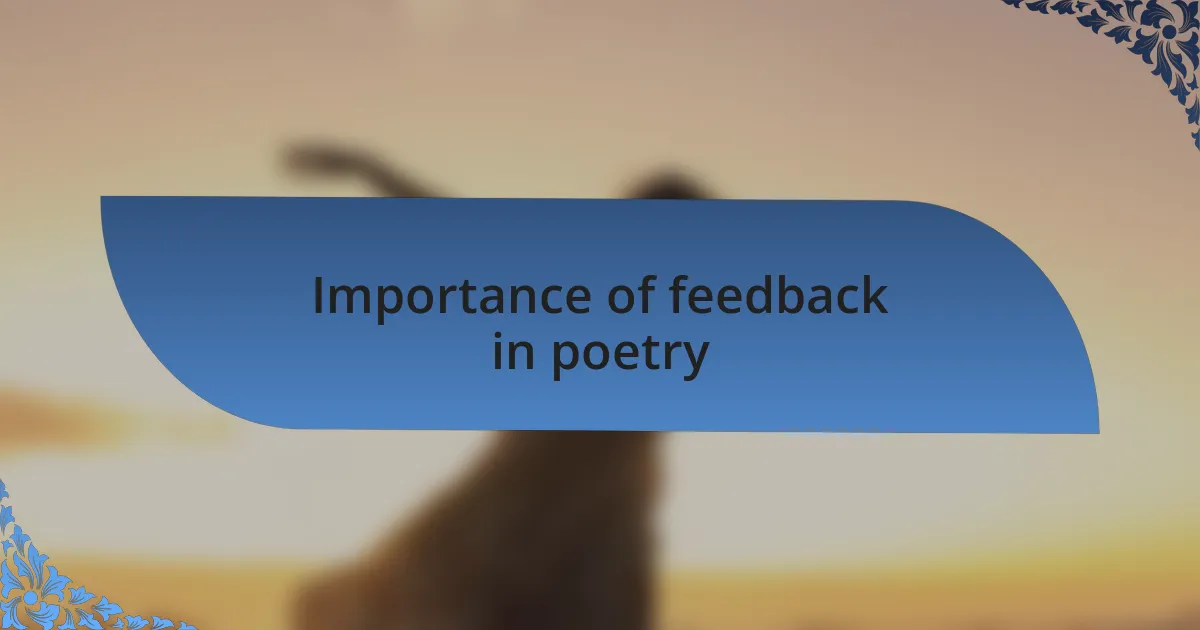
Importance of feedback in poetry
Feedback in poetry is crucial for refining our voice and style. I remember a time when I received feedback that felt too close to home. A mentor pointed out that my imagery was clichéd, a punch to my pride, but it ultimately pushed me to dig deeper, explore fresh metaphors, and enhance my writing. Have you ever been surprised by how much a single comment could shake the foundation of your work, leading to a profound transformation?
In many ways, feedback functions as a collaboration between writers and their readers. I once attended a poetry slam where the audience’s reactions to various pieces were immediate and visceral. The way certain lines resonated or fell flat in real-time provided an invaluable lesson. It made me wonder—how can we better attune our writing to audience expectations and emotional responses when crafting our work?
Receiving feedback also cultivates a sense of community within the poetry world. Sharing my drafts with fellow poets often feels like unearthing hidden gems. Their perspectives have not just enhanced my individual pieces; they’ve allowed me to embrace vulnerability in my writing journey. Do we fully appreciate the transformative power of community feedback and the support it offers in our creative exploration?
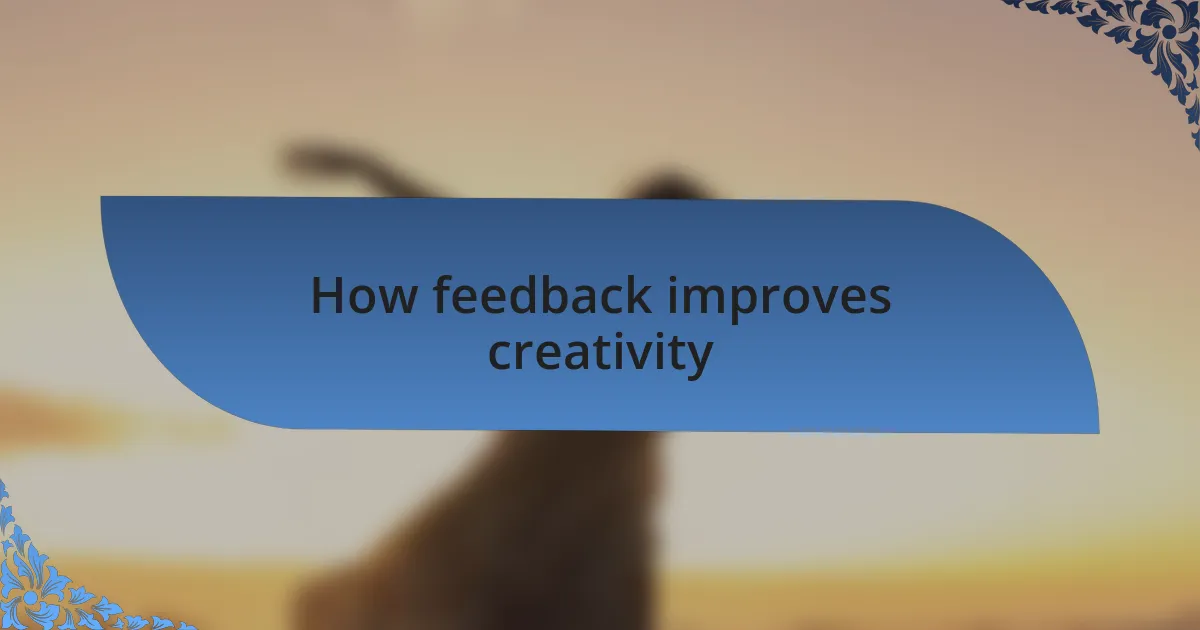
How feedback improves creativity
Feedback opens doors to unexplored ideas, often sparking creative breakthroughs. I remember a particularly challenging workshop where a fellow poet suggested I break away from my usual structure. That one suggestion pushed me to experiment with free verse, revolutionizing my approach and filling my work with unexpected rhythms and emotions. Have you ever stumbled upon a new creative pathway just because someone dared to challenge your norms?
Moreover, feedback acts as a mirror reflecting our writing back at us, revealing nuances we might overlook. I once shared a piece that felt complete to me, but a reader pointed out an emotional disconnect in one stanza. That observation lit a fire in me to reconnect with my original intent, allowing me to weave a deeper, more personal narrative. How much richer could our poetry become if we remained open to these gentle nudges in our creative process?
Ultimately, engaging with feedback is an act of courage. There have been times when the thought of sharing my work felt like exposing a raw nerve. Yet, the insights I received propelled me to refine my voice beyond my initial comfort zone, fostering a creative evolution I didn’t know was possible. Can we afford to shy away from such growth opportunities, knowing how transformative they can be?
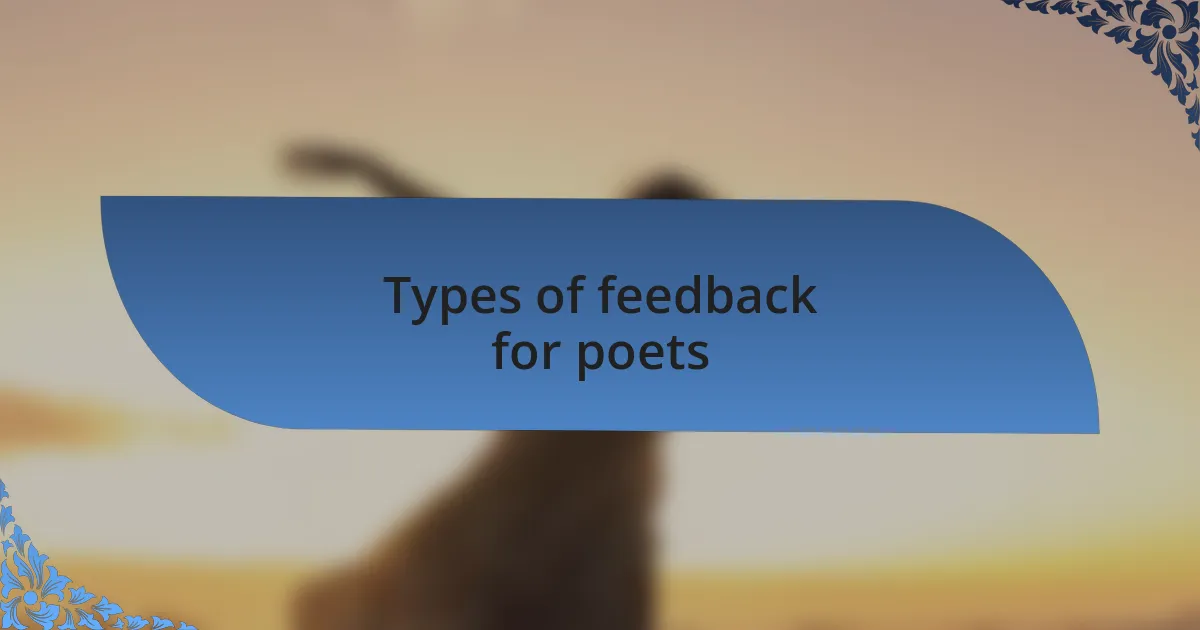
Types of feedback for poets
Receiving feedback on my poetry can take many forms, each playing a distinct role in refining my craft. For instance, constructive criticism from a trusted mentor helped me realize my work often leaned too heavily on clichés. That insight was not easy to digest, but it drove me to dig deeper, finding fresh ways to express familiar feelings. Have you ever felt uncomfortable with a piece of advice that turned out to be exactly what you needed?
Peer reviews can also provide a different flavor of feedback, often filled with diverse interpretations. I recall sharing a poem about loss with a vibrant group of fellow writers. Each person brought their own perspective, prompting me to see my words through their eyes. The range of emotions that emerged from their interpretations not only enriched my understanding but also inspired me to explore themes I hadn’t initially considered. How often do we limit our vision by viewing our work through our own lens alone?
Finally, audience feedback, especially from readings or social media, offers a real-time gauge of how my poetry resonates. One night, after a performance, a stranger approached me to share how my poem about joy connected with her own experiences of struggle. Her words lingered, reinforcing the idea that poetry can bridge personal boundaries and create community. Have you ever experienced that magical moment when your writing truly connects with someone else?
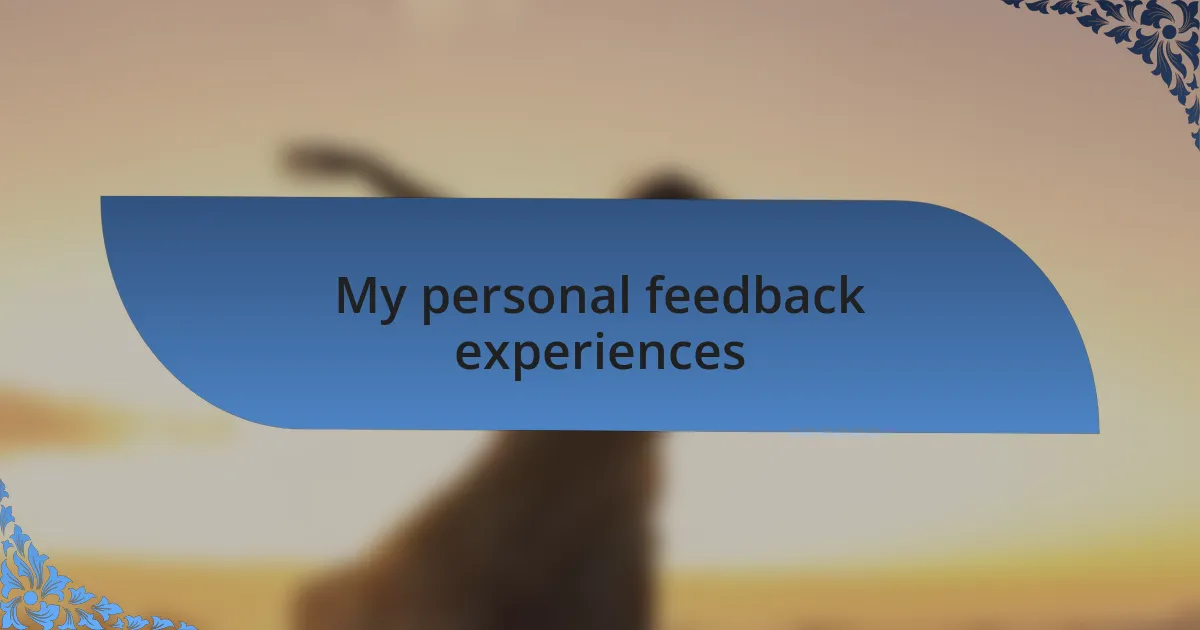
My personal feedback experiences
Feedback has often challenged me to confront my own vulnerabilities as a writer. I remember an open mic night where a fellow poet pointed out that my use of metaphor sometimes obscured rather than illuminated my message. Initially, I felt defensive; I had invested so much in my craft. However, reflecting on his words later, I realized that clarity is as important as creativity. Have you ever had someone challenge your vision in a way that reshapes how you see your work?
One memorable instance of personal feedback came from a workshop where my poem was critiqued by a small group. They highlighted various lines that resonated differently based on their backgrounds. This experience showed me how a single piece can spark such diverse feelings and interpretations. Did I realize that my writing carried multiple layers? At that moment, I understood that embracing feedback doesn’t just help refine my craft; it can also expand its reach.
Feedback isn’t always easy to hear. Once, after sharing my work online, I received a comment that described my poem as “emotionally flat.” I sat with that feedback for a week, grappling with the sting. But I came to see it not as a dismissal but as a nudge towards deeper authenticity. Have you ever faced criticism that felt harsh but prompted you to uncover deeper truths in your work? In the end, that feedback pushed me to connect more genuinely with my emotions, and for that, I am grateful.
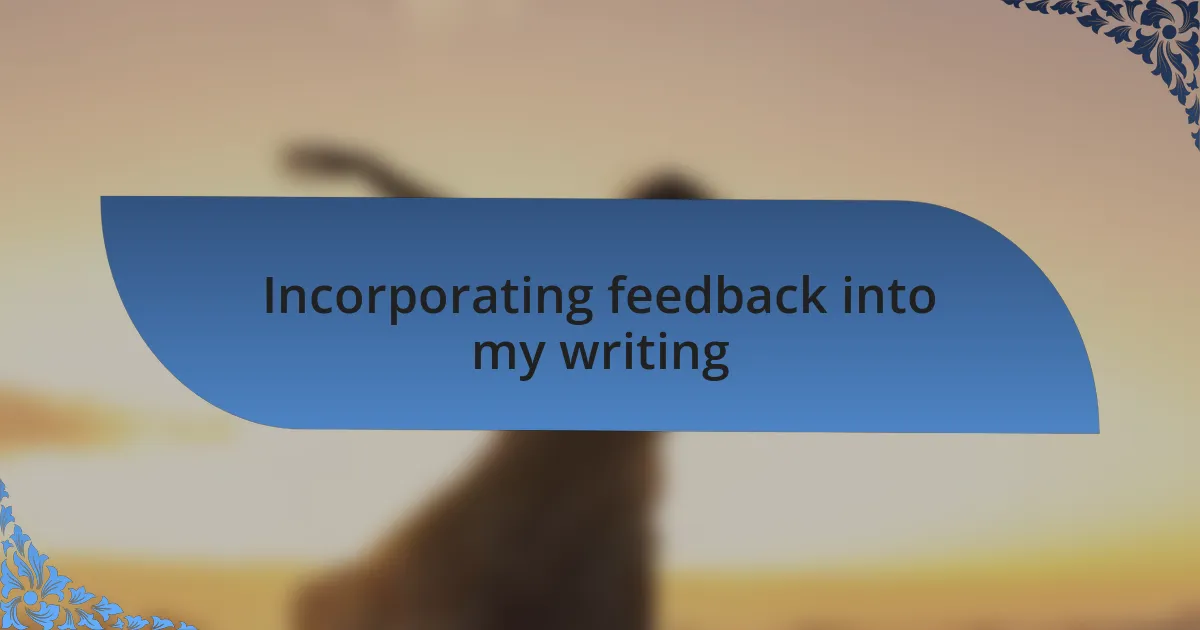
Incorporating feedback into my writing
Incorporating feedback into my writing has become a transformative experience. I recall receiving a critique about the rhythm in one of my earlier pieces—someone suggested that it felt jarring in places. At first, I resisted the idea; however, after revisiting the poem with fresh eyes, I could see the truth in their observation. Isn’t it fascinating how the cadence of our words can influence the emotions they evoke? I realized that mastering rhythm is just as crucial as choosing the right words.
Another insightful moment came during a collaborative project where my peers offered suggestions on tone and style. One suggested shifting from a formal tone to a more intimate one, which felt challenging. However, after making the adjustments, my poem took on a life of its own. It was as if the lines breathed, reaching out to touch the reader’s heart. Have you ever experienced that shift when feedback unlocks something you hadn’t considered?
Sometimes, I find that feedback can reveal blind spots I didn’t even know I had. After sharing my work with a mentor, she pointed out that my imagery was often tied to specific cultural references. While I loved those images, she encouraged me to broaden my appeal so that the poem could resonate with a wider audience. That conversation opened my eyes to the importance of inclusivity in creativity. How has feedback helped you identify areas for growth in your writing? For me, it’s a valuable reminder that my words exist not just for me, but for others to connect with as well.